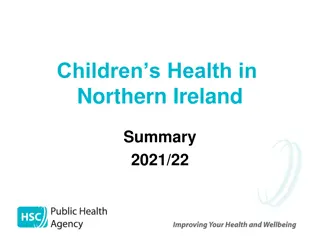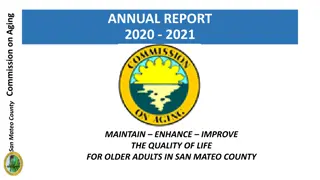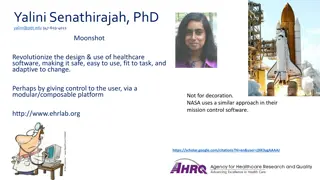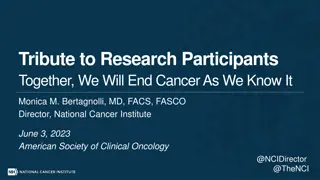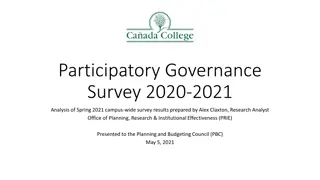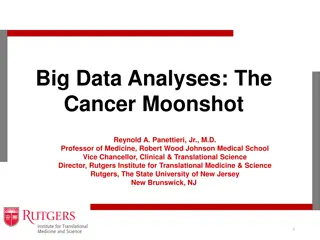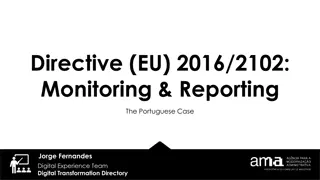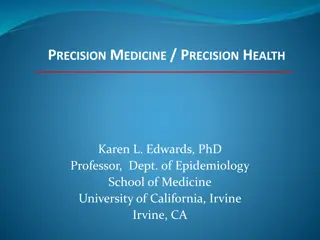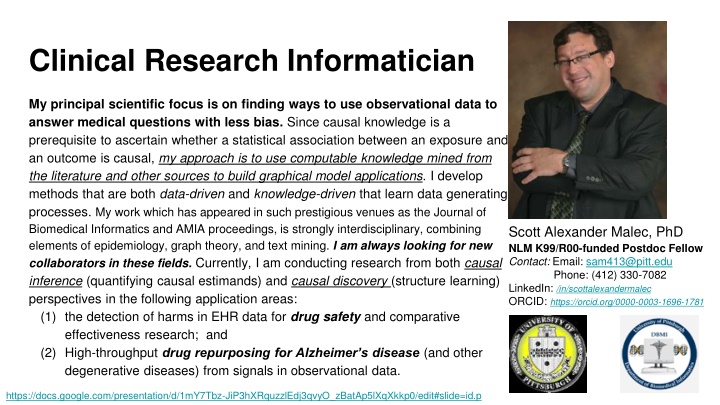
Innovative Causal Inference Methods in Clinical Research Informatics
Discover how a Clinical Research Informatician uses observational data and computable knowledge to find unbiased answers to medical questions. Learn about their research on drug safety, comparative effectiveness, and drug repurposing for Alzheimer's disease.
Download Presentation

Please find below an Image/Link to download the presentation.
The content on the website is provided AS IS for your information and personal use only. It may not be sold, licensed, or shared on other websites without obtaining consent from the author. If you encounter any issues during the download, it is possible that the publisher has removed the file from their server.
You are allowed to download the files provided on this website for personal or commercial use, subject to the condition that they are used lawfully. All files are the property of their respective owners.
The content on the website is provided AS IS for your information and personal use only. It may not be sold, licensed, or shared on other websites without obtaining consent from the author.
E N D
Presentation Transcript
Clinical Research Informatician My principal scientific focus is on finding ways to use observational data to answer medical questions with less bias. Since causal knowledge is a prerequisite to ascertain whether a statistical association between an exposure and an outcome is causal, my approach is to use computable knowledge mined from the literature and other sources to build graphical model applications. I develop methods that are both data-driven and knowledge-driven that learn data generating processes. My work which has appeared in such prestigious venues as the Journal of Biomedical Informatics and AMIA proceedings, is strongly interdisciplinary, combining elements of epidemiology, graph theory, and text mining. I am always looking for new collaborators in these fields. Currently, I am conducting research from both causal inference (quantifying causal estimands) and causal discovery (structure learning) perspectives in the following application areas: (1) the detection of harms in EHR data for drug safety and comparative effectiveness research; and (2) High-throughput drug repurposing for Alzheimer s disease (and other degenerative diseases) from signals in observational data. Scott Alexander Malec, PhD NLM K99/R00-funded Postdoc Fellow Contact: Email: sam413@pitt.edu Phone: (412) 330-7082 LinkedIn: /in/scottalexandermalec ORCID: https://orcid.org/0000-0003-1696-1781 https://docs.google.com/presentation/d/1mY7Tbz-JiP3hXRquzzlEdj3qvyO_zBatAp5lXqXkkp0/edit#slide=id.p
Literature-informed Pharmacovigilance Key Tools Knowledge: SemMedDB Causal inference: TMLE, CEM Codebase: currently in R, postgres GitHub: /kingfish777/causalSemantics Project Details Funding: NLM T 15 (8/1/18-7/31/21), NLM K99/R00 (8/1/2021-7/31/25) [ 1K99LM013367-01A1 ] Collaborators: PITT (SoM, Pharm), UW-Seattle, UTH-Houston https://doi.org/10.1016/j.jbi.2021.103719
Drug Repurposing for Alzheimers Disease Third-factor phenotype variables linking depression with Alzheimer s disease Key Tools Knowledge: SemMedDB, OBO Knowledge representation: Pheknowlator Knowledge Graph Machine readers: SemRep (NIH/NLM); REACH, EIDOS (DARPA) Causal inference: TMLE, CEM Codebase: python, R, postgres GitHub: /dbmi-pitt/alz_lbgcm & /kingfish777/semiramis Project Details Funding: Pitt MOMENTUM (2020), NLM T 15 (8/1/18-7/31/21), NLM K99/R00 (8/1/2021-7/31/25) [ 1K99LM013367-01A1 ] Collaborators: PITT (SoM, ISP, SPH), U Colorado, UW-Seattle


